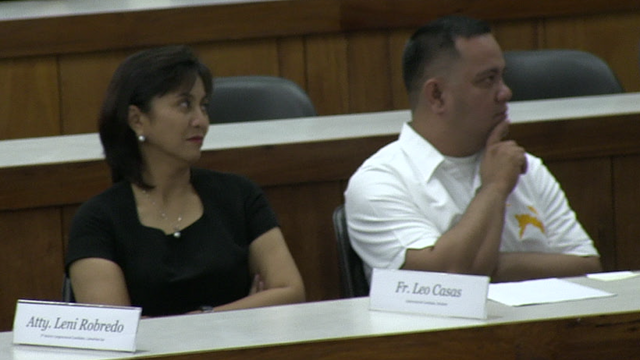SUMMARY
This is AI generated summarization, which may have errors. For context, always refer to the full article.

MANILA, Philippines – Bernadine Joson is a secretary of the Sangguniang Bayan of Lagayan, Abra. She is also a star witness in a plunder case against a long-running political dynasty in her town, the Lunas.
In 2011, she filed several charges against the powerful clan. Come 2013, she will be running for mayor against two members of the family she helped bring to court.
The decision to run was “much like a sacrifice,” Joson said in an elections forum hosted by the Ateneo de Manila School of Government on Friday, December 7. “Even if I’m just a common individual, I came up with the decision…even at the expense of my life.” She is frustrated about the little progress made by her town in all the years the Lunas have been in power.
“I pity to see that my birth place is getting older and older but has never achieved its richness,” she said.
The courage and conviction is there, clearly, but the question is: Can new faces stand a chance against politically entrenched families? It’s a question confronting not only Joson but a number of other ordinary citizens people who will go up against those already in power.
Another political greenhorn, Catholic priest Leo Casas who’s a gubernatorial candidate for Masbate, acknowledges the odds they are up against. Temporarily leaving his Church duties, he has wondered he will introduce himself to his constituents without the same resources and network that his opponents have.
Casas is going against incumbent Rep. Rizalina Seachon-Lanete, who is running for governor after two terms in Congress. Her children and family members are also gunning for posts in 2013.
Helpless Comelec
The Commission on Elections (Comelec), however, can only do so much. Political dynasties are prohibited under the 1987 Constitution, but a law laying down the mechanics of the ban has yet to be enacted.
Poll commissioner Rene Sarmiento, who was a panelist at the forum, agreed with the importance of prohibiting political dynasties, a term he said first appeared in the Constitution.
While no precise definition is given in the charter, Sarmiento personally interpreted it and echoed his support for an enabling law. “The concept of political dynasty refers to a political monarchy that creates a political monopoly in different parts of the country, depriving the young and qualified and sometimes poor candidates to aspire for political positions in these political areas,” he said.
Sarmiento said several bills have been introduced in the Senate and in the House of Representatives in support of the provision, but all 6 remain frozen. He also cited citizen’s initiatives, including the formation of Krusada Contra Dynasty, the efforts of Kapatiran and System of Initiative, and two petitions in the Supreme Court asking that the Comelec operationalize the prohibition of political dynasties.
Despite this however, Sarmiento said the Comelec’s hands are tied for now. “Honestly we cannot [do anything] unless there’s a law… a legislation passed by the people.”
Try people’s initiative
Camarines Sur congressional candidate Leni Robredo, however, said sitting and waiting for lawmakers to act on proposals may not be the best idea either.
Robredo, who is running against a member of the Villafuerte clan, said a people’s initiative pushing for the bill to pass might do the trick. The Initiative and Referendum Act allows private citizens to amend the Constitution by having a petition signed by at least 10 percent of all registered voters nationwide, 3 percent of which in every legislative district. The petition is then decided on within 45 to 90 days.
“The constitutional provision says it should be defined by law. But me, I am for initiative because we have had many attempts already in the Senate and the House, but all of them are frozen bills,” Robredo said in a mix of Filipino and English.
“So if we again attempt and the results are still the same, how long will we wait for it? So, I think, if an initiative will be pushed for the passage of the anti-dynasty bill, I will campaign for it,” she said.
Speeding up the process
Robredo said that if she were to win the congressional seat in the 3rd district of Camarines Sur, she would support pending measures to help prohibit political dynasties.
She emphasized that it was not so much family members running that she was against, but the inheritance of positions, of these being passed on from a parent to a child to a grandchild, and sometimes even their spouses.
Casas, for his part, is hoping that his ideals and beliefs would be enough to challenge the political dynasty in his province. A lack of resources was the least of his problems, he said.
“The bigger problem is, if we losewe would’ve added to the idea [in the mind of] Masbateños that there is no hope for Masbate to be governed by [those] not [in] political dynasties,” he said.
But he added that, perhaps, trying would also be enough. “You come out there and there are already armed politicians. It’s hard, but we need to at least try.” – Rappler.com
Add a comment
How does this make you feel?
There are no comments yet. Add your comment to start the conversation.